UCPI: Weekly Report 1- 2-6 November 2020
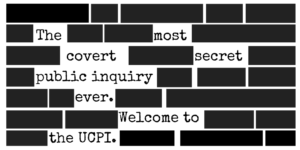 Undercover Policing Inquiry
Undercover Policing Inquiry
Weekly Report 1
2-6 November 2020
After five years of waiting, the Undercover Policing Inquiry finally got off the ground in earnest this week. This first round of hearings will be split in two parts. First, Opening Statements from all the core participants. Second will be actual evidence for the period 1968 to 1972.
The Opening Statements are a chance for the various parties to essentially lay out how they view things. They began with the Counsel to the Tribunal, David Barr QC, presenting a general overview of where we stand.
This was followed by barristers for police and those who were once in the world of police but are no longer. Finally came the non-state/police core participants, whose statements will continue into this coming week. In this report we will try to summarise what was a lot of material, and reflect upon the words of the lawyers.
Barr noted that much of what the spycops did during their deployment is already public knowledge:
• deceived more than 30 women into long-term intimate relationships
• fathered children with some of these activists
• stole the identities of dead children to provide convincing cover stories
• deceived grieving families, and worked to prevent them learning the truth
• undermined anti-fascist, anti-racist, environmental, and other social justice campaigns
• were responsible for the blacklisting of thousands of workers for wanting safe working conditions or being politically active
Despite acknowledging this, it is disappointing that Mr Barr failed to properly credit the activists. The women deceived into relationships were a fundamental part of exposing the spycops. The existence of this Inquiry is based on their work.
This phase will also look at various documents and hear evidence from 1968–1972. It does not cover the actions of spycops while outside England and Wales, despite them being active in around 20 other countries during their deployment.
There were also some surprising pieces of previously undisclosed information, and statements from people previously unheard from.
How and why was the Special Demonstration Squad set up?
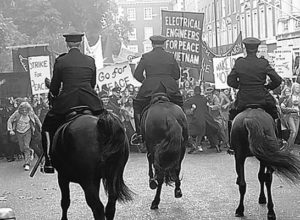
Police on horseback charge demonstrators against the Vietnam War, Grosvenor Square, London, 17 March 1968
Following the windows of the US Embassy being broken during an anti-Vietnam War demonstration in March 1968, Special Branch attempted to gather information on the next demo. Their usual tactics being unsuccessful, they created the Special Demonstration Squad (SDS) who went deep undercover, living as activists among various anti-war groups.
The next demo in October 1968 was less volatile, and this was taken as a sign of the new unit’s success. Mr Barr has stressed that the Inquiry must decide not if it was successful, but if it was a necessary or disproportionate response.
The SDS rapidly widened its scope and began investigating subversion and demonstrations and disruptions of public order. Any organisation seeking social change could easily be said to be covered by their remit. By the early 1970s, the SDS was aiming to profile anyone ‘within weeks’ of first showing interest in ‘extremist ideas’.
One of the police barristers, Oliver Sanders QC (representing 114 spycops, the majority of former and current undercovers), stated that the main function of the SDS was to assess public order threats. In the period currently being examined by the Inquiry, 1968-72, many of these came from political protests. Their secondary function was providing intelligence on ‘subversion’ to MI5.
What was the role of MI5 and the Home Office?
Since the story of the spycops surfaced, the events have been framed as the work of one rogue officer, then several rogue officers, then rogue units. Those higher up unfailingly point the finger at those lower down.
It is now clear that from the very beginning, the SDS was funded by the Home Office and reported to MI5.
Sanders provided new information:
• MI5 and spycops were so allied that MI5 considered funding the SDS
• They liaised to ensure they didn’t duplicate spying, which might have resulted in spying on each other’s officers
• MI5 recommended tips to SDS spycops, and they asked for specific info
• Most SDS intelligence reports were copied to MI5 with the file reference numbers of the people / group already added
• the SDS weren’t in a position to question MI5’s focus, thinking and efforts, but were just following orders. ‘The SDS was a politically neutral cog as part of a much larger apparatus,’ he said.
Despite the Home Office directly funding the unit for over 20 years, a 2014 report commissioned on the link between the two institutions noted the key file was suspiciously missing. However, a lot of SDS reports have been retrieved for the Inquiry from copies sent to MI5.
How are the police lawyers attempting to portray the actions of the SDS?
It is now clear the various police lawyers are switching tactics and actually trying to justify the actions of the SDS. They describe the spycops as a benevolent and useful group, indispensable to the safety of the public, who only wanted political information so that demonstrations could be effectively policed.
Claim: Police never intend to harm anyone, including the women deceived into relationships
Peter Skelton QC, for the Metropolitan Police, told the Inquiry that the Met is ‘aware of continuing anger and distress of victims of spycops’. He said the Met stands by its 2015 apology to women deceived into relationships by spycops (despite the fact that it still won’t let women see their files, and is delaying civil claims by some of them).
Richard Whittam QC, representing a smaller group of undercovers and managers, also mentioned the apology naming such activity as ‘abusive, deceitful, manipulative and wrong’. But, he said, spycops committing crime is essential for national security and the prevention and detection of other people committing crime. The apology should be seen ‘in context’, by which he seemed to mean it should be disregarded.
This echoed other police lawyers, who have implied that it was acceptable to abuse people because times were different then, and it was all done for the greater good.
Claim: Spycops are better than the alternative
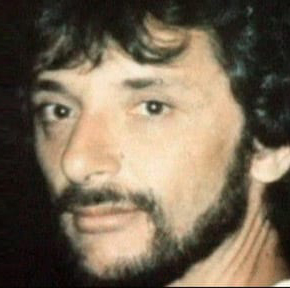
Blair Peach
Repeatedly, police noted that people have been killed on protests – citing two cases from the 1970s, Blair Peach and Kevin Gately – and there would be more death and injuries if it wasn’t for the undercovers ensuring demos were policed properly.
Contemptuously, they failed to mention that Blair Peach and Kevin Gately actually both been killed by the police; Gately in 1974 on an anti-fascist protest organised by heavily spied-on groups, and Peach in 1979 as a member of the most spied-on group of all, The Socialist Workers Party, on an anti-racist protest.
Discussing spycops stealing of dead children’s identities, Sanders said that though it was regrettable, it was necessary to prevent risk of exposure. The alternative to spycops with stolen identities was paramilitary police on demonstrations, he said. This is a patently ridiculous excuse.
Claim: Intelligence must be gathered indiscriminately
Spied-upon groups which were newly named this week include Justice for Rhodesia, Croydon Libertarians, and the St Pancras & Camden United Tenants Association. This contrasts strongly with police insistence that spycops saved the public from violent riots, murder and mayhem by infiltrating these groups; that it was necessary to spy on people who were committing no crimes in order to get to the ‘real criminals’.
The SDS essentially turned belonging to groups such as Hackney United Tenants Ad-Hoc Committee into a valid reason for the state to target you for surveillance. A report from 1973 gives the names of three people who had merely asked about the International Marxist Group.
They did, however, say they found it difficult to infiltrate black power movements; a rather telling sign that they were lacking in Black police officers.
Claim: Even though they’re bad, we can’t judge them because it was a long time ago
Essentially, police lawyers found various ways to say ‘what the spycops did may have been bad but it was a long time ago, lessons have been learned, it’s different now, nobody need lose their job or pension, move on, there’s nothing to see here’.
This directly contradicts documents that make clear the government was aware from the very beginning that what they were doing was deeply unethical, and would cause public outrage if discovered. Even by the standards of 1968, the spycops’ behaviour was blatantly immoral.
This refrain was accompanied by police barristers stating that other types of undercover work keep the public safe from paedophiles and terrorists. This is of little relevance to the activities of political secret police.
It ignores that the spycops of 2010 – long after the supposed new regulatory framework of the Human Rights Act, and Regulation of Investigatory Powers Act – were, if anything, committing even worse abuses than their 1968 counterparts.
The Inquiry also heard from representatives of the groups and individuals who were spied on
Families of the dead children whose identities were stolen
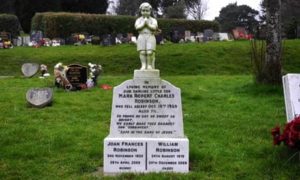
The Grave of Mark Robert Robinson whose identity was stolen by spycop Bob Lambert
The Inquiry recently informed 19 families that their dead children’s identities were stolen by spycops. The Home Office Select Committee demanded in 2013 that affected families be told, yet the Met refused. Skelton conceded that the Met hadn’t cared about the families of these children.
Sanders said this procedure was invented in an earlier time when people felt differently about death and risk (once again using the ‘it was a long time ago’ excuse), yet the practice continued until the 1990s.
Additionally, one family whose living child’s identity was stolen has been informed.
Justice campaigns of grieving families, represented by Richard Parry and Jane Deighton
These were families in mourning who just wanted answers about what had happened to their loved ones so that they could have at least some closure; in many cases the parents and relatives of people who were barely more than children, and died violent deaths under traumatic circumstances.
Instead, their efforts were blocked and police were openly hostile to them and spycops infiltrated their campaigns for the truth. Police resources that should have been spent catching killers were instead spent on obstructing justice.
As a teenager in 1993, Duwayne Brooks survived a racist attack in which his best friend Stephen Lawrence was murdered. Brooks was spied upon in an attempt to discredit his evidence. He said this week that he won’t testify unless he can see his whole police file first.
Skelton said the Met is ‘grateful’ for Duwayne Brooks’ and Stephen’s mother Doreen Lawrence’s work.
Workers with trade unions and/or politically active workers who were blacklisted
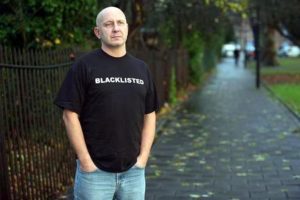
Dave Smith
Reports show that trade unions were targeted and spied on from as far back as 1973. Yet, Sanders unequivocally stated that the SDS did not have any involvement in industrial blacklisting.
It did not target justice campaigns, members of parliament or trade unions directly, it was merely inevitable collateral collection while spying on other things, he claimed. These are lies, with ‘collateral damage’ as an excuse. Whether accidental or deliberate, it’s still spying.
Dave Smith, a trade unionist and co-author of Blacklisted: The Secret War Between Big Business & Union Activists, was due to give evidence on Friday 9 November but was gagged by the Inquiry after a legal challenge to the content of his prepared statement.
Three wives (now ex-wives) of spycops, represented by Angus McCullough QC
For all but one of the wives of the undercover officers, it is the first time their words have been heard. In most cases they are now ex-wives, such was the stress their relationships were subjected to due to the activities of their husbands.
There can be no doubt that they were deceived and abused as badly as any other victim of the spycops. They were told that their husbands were gone for long periods in the interests of national security, not that they were on holiday in Thailand or Crete with women they’d manipulated into believing were the loves of their lives.
McCullough described how although they were vetted as support for their husbands, the wives and their children were offered no support during the periods of deployment. Nor were they years later, when the Met knew that the stories were about to hit the press and yet did not deign to warn them.
The officers themselves were flatly told that there would be very little support during deployment. They were given no prior warning of the psychological impact that going deep and long-term undercover would have on them. They received even less support than they’d been promised.
Skelton admitted the Met ‘hasn’t always understood’ how to support the spycops officers. Their wives, all of whom are mothers with children to care for, were used by the SDS and the Met as free, unqualified, in-house emotional support and therapy for their officers.
Peter Francis, represented by David Lock QC
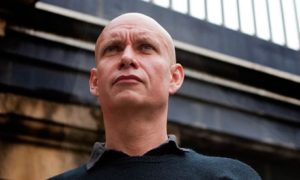
SDS whistle-blower Peter Francis
Peter Francis, the only spycop whistle-blower to have come forward, was an SDS officer from 1993-98.
This week he requested a cast-iron guarantee from the Metropolitan Commissioner of immunity to prosecution for information about spycops he revealed prior to the Inquiry starting. Under the Inquiry’s terms, witnesses including Peter Francis cannot be prosecuted for anything that he says during the proceedings.
However, he could be charged under the Official Secrets Act for his previous public statements. His pension hangs in the balance, and he will not testify without absolute confirmation he will not be charged.
It should be obvious that without his evidence, this cannot be a properly informed inquiry. Under the current timetable, the Inquiry doesn’t intend to take evidence from Francis until 2023.
People from a vast range of groups targeted for their political beliefs and activism, overwhelmingly from the left
By the Inquiry’s own admission, over 1000 groups were spied upon (although Sanders and the police themselves now deny this).
This week, they revealed the previously unknown names of just 44 of them. This comes too late for members of those groups to ascertain which of their friends or intimate partners never really existed, let alone participate in their only current chance for some kind of justice.
New photos of SDS officers published
The Inquiry also published previously unseen photos of various officers. Only one was a spycop; the rest were mostly back office staff, apparently all at the same festive event in 1968.
People are excluded from the Inquiry, including core participants
Lawyers for the non-police side noted that without names and photos of spycops it is impossible to reach all the people who were their victims. It is grossly unjust that they will not be represented through the deliberate choice of the Inquiry to exclude them.
There are a great many people who, even though they know they were spied on and have come forward, will also be excluded. Another deliberate choice by the Inquiry is to refuse to livestream the proceedings.
After this week, the hearings will be conducted in secret. Despite that fact that secure livestreams have been set up due to Covid-19, only the text will be made available after the proceedings have finished.
As already stated, over five years into the Inquiry many victims still have no documents. Many more have no names or photographs that would answer otherwise impossible, unanswerable questions.
People giving evidence who were spied on during this time were only provided with relevant documents – a total of 5,263 pages – five weeks ago. Attempting to read all of them before the start is roughly equivalent to reading all of Lord of the Rings twice a week for five weeks straight.
No diversity, no understanding
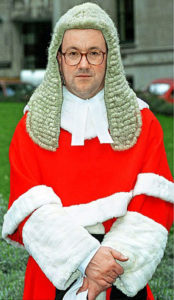
Sir John Mitting
The Inquiry’s Chair, Sir John Mitting, is not just preventing the victims’ access to full understanding, he’s determined to prevent his own. From the very beginning, calls have been made for a diverse panel of people with relevant life experience to advise and guide the Inquiry. This is standard practice for other inquiries, yet Mitting refuses to follow precedent.
The goal of this Inquiry should be to unflinchingly and honestly deal with institutional sexism, racism, and attacks on workers’ rights and the conditions of the disadvantaged. As an old white cis male Knight of the Realm who is a member of the men-only Garrick Club and finds the Macpherson definition of institutional racism ‘controversial’, comprehending these realities is beyond him.
As Ruth Brander, representing the Non Police/ State Core Participants, told him this week, ‘With respect, the concern is you, sir’.
A wise and impartial man would ask for help. Instead, Mitting refuses the offer of information that would increase the chances of a fair conclusion to the proceedings.
What next?
After two more days of opening statements from victims of spycops, the Inquiry’s first evidence hearings (Phase 1 of Tranche 1) will start on Wednesday 11 November. They will cover the formation of the Special Demonstration Squad in 1968, in response to protests against the war in Vietnam, and why it continued beyond that. They will continue until Friday 20 November.
The next set of hearings after that, taking evidence of events from 1973 to 1982, are expected in spring 2021. The Undercover Policing Inquiry has no set end-date, but is expected to perhaps conclude around 2026.
COPS will be live tweeting every hearing, producing a summary every evening, and a weekly report like this one at the weekend.
For more information including an FAQ, see the links on our UCPI Public Inquiry page.
